
Arquivo para a ‘Economia’ Categoria
UN talks on standards for drones
Abroad, of course in the midst of recession, few will receive a drone in Brazil,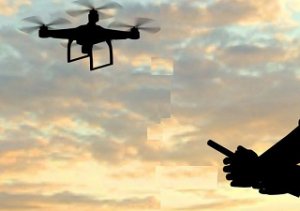 the UN has issued some rules for you to receive and be able to use a drone that wins as a gift.
the UN has issued some rules for you to receive and be able to use a drone that wins as a gift.
Although it seems obvious, the Civil Aviation Authority’s (CAA) survey suggests that only 36% of shoppers have some guidance on safe flights when buying a drone.
The first of the 10 tips says that a drone weighing more than 25kg (55lb) requires a license to operate, this is in agreement with most countries, including Brazil.
The United Nations International Civil Aviation Organization (ICAO) made this statement: “Drones can pose a serious threat to manned flights and the people and owners of flight regions.”
The ICAO says you should read the user manual, keep the drone within sight, and 50m (55 yards) of people, landowners (supposed to be light houses) or vehicles.
You must observe the laws and permits of your specific country.
The CAA drone code, which was updated in November (BBC news), has released an easy way to remember the most important parts of it using the word drone plus 5 rules:
1. Do not fly near airports or airfields
2. Remember to stay below 120m (400 feet) and at least 50m (150 feet) away from buildings and people.
3. Watch your drone all the time (keep in the field of vision, of course you do not always do this).
4. Never fly near aircraft.
5. Enjoy responsibly.
There is also a new app that you can download to make sure you are flying safely.
The future and mating of whales
Chapter 1 is finished with reflections that make past-present and  present-future interactions worthy of ample questioning, just because “living in the present does not mean that we know it” and “we lose linear evolution, come to be Programmed, the robotized future … “(MORIN, 2010, 34), stresses the French thinker.
present-future interactions worthy of ample questioning, just because “living in the present does not mean that we know it” and “we lose linear evolution, come to be Programmed, the robotized future … “(MORIN, 2010, 34), stresses the French thinker.
We must turn our gaze to the past before we want to glimpse the future. Taking Morin’s conceptions in the book in question, we may consider that as long as we believe that we know the educational past as something already unveiled, we will still be “… At night and in the haze lost in the present as unable to see tomorrow.
The second and final chapter entitled “the mating of whales,” he wonders about the possibility of global society giving rise to a notion of “new” humanity. New on our account, during the book period, there was still a cold war between the United States and the Soviet Union, but now we are there with Fidel’s death in Cuba, Donald Trump, the French right-wing almost in power and Putin in Russia, is a back to the past?
Because the whales mating, because they are the symbol of the fight for the planet.
Morin points to awareness about the potential annihilation of the planet as water resources, reforestation and a realization of gravity that prevents the death of all.
Finally Morin reflects on the possibilities of resistance of global society and around a catastrophic future, the possibility of a “mega-dead” (MORIN, 2010, 56), which would become a vector for the construction of a planetary humanity, That would avert the ruin of man.
In addition to this, another point that the author highlights is a great positivity amid the misleading economic development of nascent neoliberalism: the perception that “the future is no longer the dazzling march forward, or rather it is the dazzling march towards In the face of the threats of annihilation which we must resist … “(p.62).
MORIN, E. Para onde vai o mundo? (Where is the world going? )Translation by Francisco Morás. Petrópolis, RJ: Editora Vozes, 2010.
Were is the world going?
This happens to me often, I go into a bookstore to see a book and another jumps 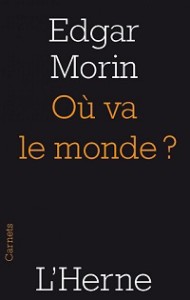 right into my mind, the phenomenon is less common on the internet, and they say it scatters.
right into my mind, the phenomenon is less common on the internet, and they say it scatters.
Wherever the world goes, Edgar Morin seemed to want to confide me something, about Trump unlikely, about ecology perhaps, the book is from 2007, although the Brazilian edition of 2012.
Sometimes I skip the preface, but this one by François L`Vonnet is very good, starts talking about the construction of a solitary work, although Morin so often spoke of the woman.
L ‘Yvonnet’s preface speaks of his “original work, one of the most consistent of our age, which makes complexity a fundamental problem and a new paradigm.” (Preface, page 7).
It speaks of the emptying of man, helped “to shatter it, to fragment it, depriving it of its multidimensional richness (its identity is both biological, psychological and social)” (ibid., page. 8).
For L’Yvonnet the human being must be enriched with all its contradictions. The thought must be’dialogical ‘, capable of letting the contraries flow, which complement each other and fight each other. “(Idem, page 8).
He repeats Heraclitus, “living from the dead and dying of life,” recalls the anthropological pseudo-syntheses of man “man is not only homo’s pacifiers” (while he knows and knows that he knows), “faber” (Calculator and moved exclusively by personal interest), concepts that are not only reductive (and narcissistically valuable), which put the human being in a corner, that is, isolate him from everything “(idem).
Man is “equally and indissolubly” (while inventing, imagining or killing) and “ludens” (while amusing, exalting, weaving).
Morin’s new humanism and examination of the future “resists any blissful reconciliation or optimism.” (Ibid.), But proposes a “planetary humanism, which brings about an awareness of the” Homeland “as the community of destiny that is the source of perdition” (idem)..
This is just a tasting, so we can talk to “Where is the world”.
MORIN, E. Où va le monde ?, Paris: L`Herne, 2007
Better things of life
We continue reading Peter Kreeft, in Socrates’ alleged dialogue with 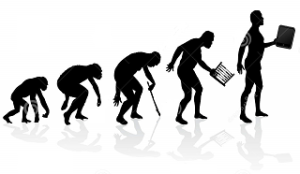 Peter Pragma, are now talking about professions, and Peter says:
Peter Pragma, are now talking about professions, and Peter says:
“PETER: Well, that’s what I’d choose: practical, not theoretical, sciences. Technology
SOCRATES: Right. So far we have mentioned three areas of study for you: business, practical science, or technology, and liberal arts. Do you see what each of them can give you?
PETER: Of course. Business: will bring money, power technology, and liberal arts pain.
They continue the dialogue and later Socrates says:
SOCRATES: And what are the ends for which power and technology are means?
PETER: Making the world a better place to live. Cars, rockets, bridges, artificial organs and Pac-Man.
SOCRATES: So, technology improves the material things of the world.
PETER: Yes, including our own bodies. That’s pretty important, do not you think?
SOCRATES: Oh yes. But I wonder if there should be something even more important to us. If we could improve our own lives, our own actions, our own behavior … “(Kreeft, 2016, 34)
It is not conclusive, but the reasoning is somewhat complete on page 35, where Socrates says about good and good:
SOCRATES: Well, not necessarily “better” in an absolute and unlimited sense, especially if we use “good” and “good” without defining them. … “and continues, but Peter refutes:
PETER: Politics and ethics? Impossible. I want something practical.
We will return to the question of technology in the next topic.
Pages in Brazilian Edition: KREEFT, P. As melhores coisas da vida. Campinas: Ecclesiae, 2016.
The best things in life
It is not a manual or a self-help message, there are thousands nowadays,  Peter Kreeft’s book plunges his gaze into the dogmas of modern life: power, pleasure, truth and good life.
Peter Kreeft’s book plunges his gaze into the dogmas of modern life: power, pleasure, truth and good life.
I believe that there are many people reading it without citing it, not because it is brilliant but rather inspired, see this phrase at the end of its preface, supposing that Socrates, the philosopher, appears miraculously in a university questioning convinced that: “An unexamined life is not worth living,” it seems I’ve read something like that.
In the preamble, made by a supposed Ancien of Athens, to my knowledge there is no such figure, he recalls that the oracle of classical antiquity taught us to question “our ancient gods, the foundation of our State … but it detonates two gods of our Society: Power and Pleasure, putting in their place a vague and invisible deity, which Socrates does not even name …. “(Kreeft, 2016, p.11).
He reminds us that “we named several gods, but Socrates did not.” And he recalls that the altar built by Socrates, to the unknown god therefore there is no statue, is the God of the apostle Paul, also in Acts 17, “also a destroyer of secular utopias – Both yours and ours. “(Kreeft, 2016, p.12).
In chapter I, topic 2, “From liberal education and careers” (pages 25-40), he points out how there are thousands of things to distract us, the author puts himself in the imaginary figure of Peter Pragma (of pragmatics?), Which Is it good in itself? And receives the answer from the answer:
SOCRATES: What about happiness? Is happiness chosen as a means to something different – wealth, or pleasure, or reputation? Are not all these things chosen as a means to happiness? (Kreeft, 2016, 27) and goes on questioning everything as such “means” until he reaches the money, then receives from the revived Socrates:
SOCRATES: So you’re interested in those courses, science and business, as a means of getting a good job, and employment as a means of making money, and money as a means of buying “a slice of cake,” right?
PETER: On the fly. (Kreeft, 2016, p.29).
SOCRATES: Now you hit the fly too. Yes, those things you expect to see with your money would be some of them would have an end in itself? A car, for example? Or a house? (Ibid., P. 30).
Everything is being questioned by Socrates, following the logic “an unexamined journey is not worth living” (page 39), but the next step is to be questioned in a “logic.”
KREEFT, Peter. The best things in life. Illionois; IVPBooks, 1984, (edition Portuguese: Campinas: Ecclesiae, 2016).
3-year digital currency
The data is an IBM research, more than market share through the NASDAQ stock exchange, where electronic and digital stocks are already glimpsed as if they were commodities (in fact, this special type of stock market is characterized by By bringing together high-tech companies in electronics, IT, telecommunications, biotechnology, etc.), it seems that Blockchain has come to stay.
stock exchange, where electronic and digital stocks are already glimpsed as if they were commodities (in fact, this special type of stock market is characterized by By bringing together high-tech companies in electronics, IT, telecommunications, biotechnology, etc.), it seems that Blockchain has come to stay.
According to a study by IBM, most Blockchain trading solutions are already being adopted by banks and financial institutions, it is likely that in three years it will exceed the 50% mark and can reach 65% of the business, which is a new business model of this sector.
The research is demarcated into two parts, revealing that 16% of the banks and 14% of the financial institutions that were part of the research guarantee that they intend to implement several Blockchain solution services on a large scale.
For banks, the survey showed that 65% expect to have solutions in 3 years, with a slightly slower adoption and cautious, and although they may have setbacks, the report pointed out that “These pathfinders are better positioned against the competition, which includes Companies that have been born disruptive, such as the Fintechs “, so this adoption of digital coins is practically inevitable.
The survey also pointed out that the number of adoption increases when we think of payments in retail (80%) and loan (79%), since digital platforms are available for these two types of financing.
The research points out that organizations expect that the benefits brought by
As for the public, since the barriers that prevent the fastest evolution of technology are the regulatory restrictions (56%), technological immaturity (54%) and return on investment (52%), despite the technological gap, numbers already give the majority .
The Web can change more?
The new changes around parallel institutions, we will comment one of them today, JQuery, seems to point to deeper changes in the Web 3.0 Web (linked data) and Web 4.0 (intelligent agents).
point to deeper changes in the Web 3.0 Web (linked data) and Web 4.0 (intelligent agents).
JQuery went on to become Founding JS, to support and governance to the projects that are developed from JavaScript, the Foundation is an initiative Linux but with companies like IBM, Samsung and Sauce Labs and many others.
The Executive Director of JS, Kris Borchers, stated that “for a long time, we have offered support to the JQuery community, and the new brand aims to reflect this reality,” but now according to his words, “Center of gravity” is the open standard JavaScript.
The changes will come because the projects (23 total), among them the test frameworks Appium and Mocha, the Dojo Toolkit, linting utility (verification code to identify errors and problems) ESLint, JerryScript.
This new institution will promote widespread adoption and permanent solutions development JavaScript, and related technologies, facilitating collaboration with the community.
The founding members of JS, as former members of the JQuery, were IBM, Samsung, Sauce Labs, Bocoup, Ripple, Sense Tecnic Systems, SitePen, StackPath, the University of Westminster and the WebsiteSetup.
The Brazil has a very active JS community and his designs can be seen on its site.
Smartphones catch fire?
No, of course great care must be taken as not to leave for long time in the making, avoid turning on when there is too much variation in voltage, etc. but recently it happened some cases that drew attention.
avoid turning on when there is too much variation in voltage, etc. but recently it happened some cases that drew attention.
The mobile technology Samsung Galaxy Note 7 caught fire in the US, despite the company having made a great product recall last month, and the case drew the attention of the company.
As the Commission of American Security Consumer Products (CPSC, acronym in English), in an official report last month (15/09) 26 incidents with burns had occurred in the United States, and the alert was triggered.
Complaints started happening last month, and were sales were immediately suspended in the 10 markets where it already sold, but Brazil had not yet received the product.
Samsung has received 92 reports of batteries overheating in the US, of which 26 are reports of burns and other 55 material damage, like fires in cars or garages, the CPSC advised consumers to switch off appliances.
Prior to these reports the number set of fire in smartphones in the world could not reach a dozen and many were cases of misuse, leave plenty of time plugged in or high voltage variations, it is not to cause any alarm.
Brasilia (DF) receives IT Congress
South America gets for the first time, the WCIT Brazil in 2016 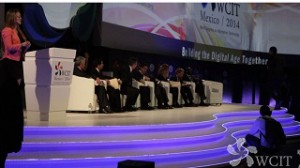 (World Congress of Information Technology), considered mega event in the IT field, the last was in Mexico (photo).
(World Congress of Information Technology), considered mega event in the IT field, the last was in Mexico (photo).
The 20th edition of the mega event, which takes place in Brasilia, started on Monday (3/10) and runs until tomorrow Wednesday, day 5.
The event this year’s theme is: will Promises of the digital age: challenges and opportunities, discussing technological advances and how society should prepare for the appropriate use of these new tools.
According to Humberto Bueno, director of Memora company and creator of the award WITSA Emerging Digital Solutions (Weds): “We are extremely excited to receive in Brasilia what we consider our Olympiad sector, discussing public and private policies that impact the digital world and the society”.
Brazilian society is not enthusiastic about the technology, so there is the obsolescence of technologies such as misuse of tools that could help the society in crisis.
The eento will be attended by entrepreneurs and academics in the industry from more than 80 countries, and connected global association World Information Technology and Services Alliance (WITSA) and organized by the Federation of Brazilian Information Technology Companies (National Assespro).
Co-creator of the technology essential to the functioning of the Internet (TCP), the mathematician Vinton Gray Cerf, will attend the event, and will speak on “unlimited Business: Internet in the XXI century” and the “Future of Work”.
The last edition of the event generated about $ U $ 95 million in business, is expected to arrive in Brazil to $ 100 million dollars, about R $ 340 million brazilian’s real.
Elections in brazilian cities with the highest GDP
According to the IBGE, the municipalities that have in common the 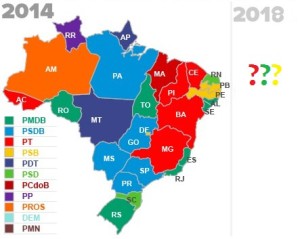 concentration and service activities, financial intermediation, trade and public administration, with the exception of Manaus, had the following results in the municipal elections yesterday:
concentration and service activities, financial intermediation, trade and public administration, with the exception of Manaus, had the following results in the municipal elections yesterday:
The city of São Paulo, which has the largest GDP had John Doria Junior candidate (PSDB) winning in the first round with Fernando Haddad (PT) in Second, in Rio de Janeiro Marcelo Bezerra Crivela (PRB) goes to the second round with Marcelo Ribeiro Freixo (PSOL), Brasilia (DF) has elections to be federal capital is a district in Curitiba Rafael Greca (PMN) goes to the second round wrangler gift Ney Leprevost (PSD), Belo Horizonte João Leite (PSDB) will have as a competitor Alexandre Kalil (PHS) for the second round and close to the capital framework with high GDP Porto Alegre Nelson Marchezan Junior (PSDB) will compete in the second round with Sebastian Melo (PMDB).
Having elected only one mayor in the capital of Acre, the re-elected Marcus Alexander the PT comes out as big loser, but the PMDB could also expect more: Marta Suplicy lost in São Paulo, Pedro Paulo Teixeira in Rio de Janeiro, and appears in front of the second round in Florianopolis with Jean Loureiro, Emanuel Pinheiro in Cuiabá and Iris Resende in Goiania, but there will be the second round, even just elected Teresa in Boa Vista, Roraima.
The most conservative forces reelected ACM Neto (DEM) in Salvador, Luciano Cartaxo (PSD) in Singapore, and several seconds shifts as in Campo Grande (MS) with Marquinhos Trad, Angela Amin (PP) in Florianopolis, Amaro Neto (SD) in Vitória (ES).
The news party REDE (Network) had a dull performance, race 2nd turn in Macapá (Amapá is little state) with Clécio Luis against Gilvam Borges (PMDB), the PDT got some capitals as Natal (RN) and dispute a few seconds turns, as Fortaleza (CE) and São Luís (MA), the PSB has shrunk, elected Amastha in Palmas ( TO) and to runoff in Recife and Aracaju.
Can you make a balance, the PSDB grows somewhat, the PT and PMDB weaken, there are new forces, the left has two options, either the PT reinvents or PSOL could be the viable option.
Municipal elections have more local outlines the political framework for 2018 is possible more changes.

